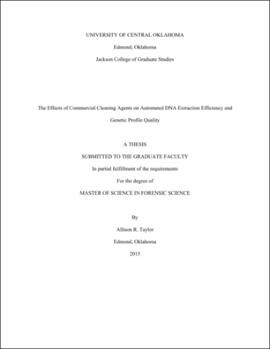| dc.contributor.advisor | Lord, Wayne D. | |
| dc.contributor.author | Taylor, Allison R. | |
| dc.date.accessioned | 2020-07-13T19:06:43Z | |
| dc.date.available | 2020-07-13T19:06:43Z | |
| dc.date.issued | 2015 | |
| dc.identifier.other | (AlmaMMSId)9982440270102196 | |
| dc.identifier.uri | https://hdl.handle.net/11244/325250 | |
| dc.description.abstract | As forensic DNA analysis has experienced countless advances in the past several decades, it has gained considerable notoriety among the general public, including those that are involved in the commission of crimes, leading to biological evidence that has been contaminated with various cleaning products in an attempt to conceal or destroy DNA evidence. This research examined the effects that three types of cleaning agents have on the ability of the Applied Biosystems® Automate Express™ Forensic DNA Extraction System to efficiently extract high quality DNA free from inhibiting compounds using the Prepfiler Express™ Forensic DNA Extraction Kit. This study further assessed the impact that these chemicals have on the entire forensic DNA analysis process through evaluation of the quality of genetic profiles using a quantitative scale. A dilution series (neat to 1:1000) was prepared from whole human blood, as well as from a bleach product containing sodium hydroxide, a quaternary ammonium-based multi-surface cleaner, and a carpet cleaner with hydrogen peroxide as the active ingredient. Each blood dilution was combined with each dilution of the three cleaning products and each of those samples was analyzed in triplicate. The amount of DNA extracted from bleach-treated samples was reduced compared to corresponding control samples due to destruction of the DNA prior to extraction. The quantification results from samples treated with both the ammonium-based cleaner and the hydrogen peroxide carpet cleaner were similar to controls. The automated system successfully removed inhibitory compounds from samples containing sodium hydroxide and quaternary ammonium compounds, but the blood samples containing the concentrated hydrogen peroxide cleaner showed increased inhibition. The genetic profile quality scores indicated that the ammonium-based cleaner had no effect on profiles regardless of the dilution ratio of the sample, while samples containing at least equal amounts of bleach and blood can be expected to display extensive dropout of alleles. The inhibition previously mentioned due to the hydrogen peroxide carpet cleaner completely inhibited amplification in samples containing 1:100 or 1:1000 diluted blood treated with neat carpet cleaner. These results indicate that crime scene personnel should document any cleaning agents that may have contaminated biological evidence as it could significantly impact the results of DNA analysis depending on the type of product and its concentration in relation to the evidence. | |
| dc.rights | All rights reserved by the author, who has granted UCO Chambers Library the non-exclusive right to share this material in its online repositories. Contact UCO Chambers Library's Digital Initiatives Working Group at diwg@uco.edu for the permission policy on the use, reproduction or distribution of this material. | |
| dc.subject.lcsh | Forensic genetics | |
| dc.subject.lcsh | Cleaning compounds | |
| dc.title | The effects of commercial cleaning agents on automated DNA extraction efficiency and genetic profile quality. | |
| dc.type | Academic theses | |
| dc.contributor.committeeMember | Adams, Dwight E. | |
| dc.contributor.committeeMember | Creecy, James P. | |
| dc.thesis.degree | M.S., Forensic Science | |
| dc.subject.keywords | biochemistry | |
| dc.subject.keywords | molecular biology | |
| dc.subject.keywords | Automated extraction | |
| dc.subject.keywords | Commercial cleaners | |
| dc.subject.keywords | DNA | |
| dc.subject.keywords | Forensic | |
| dc.subject.keywords | PCR inhibition | |
| dc.identifier.oclc | (OCoLC)ocn948297883 | |
| uco.group | UCO - Graduate Works and Theses::UCO - Theses | |
| thesis.degree.grantor | Jackson College of Graduate Studies | |
